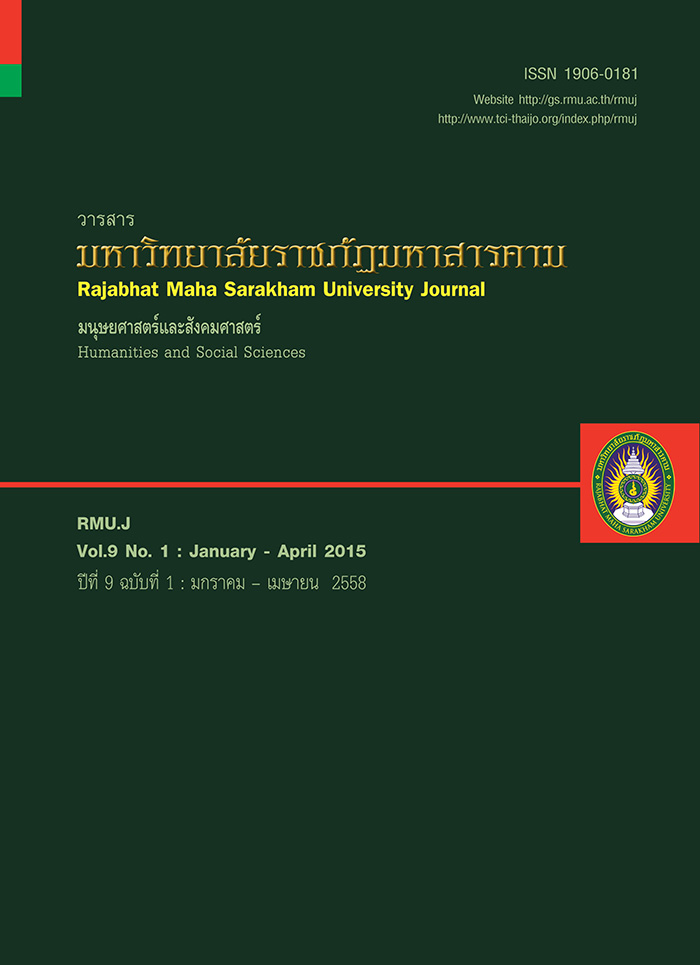รูปแบบการขับเคลื่อนกระบวนการเรียนรู้หมอลำ บ้านโนนค้อโดยเครือข่ายศูนย์ดำรงมรดกอีสาน สำรองเรืองประพันธ์;The Molam Learning Process Used at Ban Non KhoConducted by the Samrongrueangpraphan Issan Heritage Maintenance Center
Main Article Content
บทคัดย่อ
การวิจัยครั้งนี้มีวัตถุประสงค์เพื่อศึกษารูปแบบการขับเคลื่อนกระบวนการเรียนรู้ หมอลำบ้านโนนค้อโดยเครือข่ายศูนย์ดำรง
มรดกอีสาน สำรองเรืองประพันธ์ การวิจัยครั้งนี้ เป็นการวิจัยเชิงคุณภาพ ออกแบบโดยใช้ระเบียบวิจัยปฏิบัติการแบบมีส่วนร่วม และ
ประยุกต์ใช้วิธีวิทยาการวิจัยเพื่อพัฒนาท้องถิ่น เป็นฐานในการขับเคลื่อนนวัตกรรม โดยกำหนดขอบเขตการวิจัย 3 ด้าน 1) ด้านพื้นที่
วิจัย ได้แก่ จังหวัดมหาสารคามและจังหวัดกาฬสินธุ์ และศูนย์ดำรงมรดกอีสานสำรอง เรืองประพันธ์ 2) ด้านระยะเวลาในการวิจัย
พ.ศ. 2555-2556 3) ด้านกลุ่มเป้าหมาย ได้แก่ ครูภูมิปัญญา หมอลำในเครือข่ายหมอลำศูนย์ดำรงมรดกอีสานสำรอง เรืองประพันธ์
จำนวน 15 คน กลุ่มเจาะจง ได้แก่ ผู้บริหาร ครู ผู้ปกครองและนักเรียน โรงเรียนบ้านส้มกบ โรงเรียนบ้านดอนกลอยโนนชาด
(พิลาศอุปถัมภ์) โรงเรียนบ้านคอกม้า ในปีการศึกษา 2555 จำนวน 127 คน กลุ่มสมัครใจ ได้แก่ เด็ก เยาวชน ผู้ปกครองจากบ้านโนน
ค้อ หมู่ 6 หมู่ 14 จังหวัดมหาสารคาม และบุคคลที่สนใจทั่วไปในจังหวัดมหาสารคามและกาฬสินธุ์ จำนวน 28 คน เก็บรวบรวมข้อมูล
จากเอกสาร และข้อมูลในภาคสนาม เครื่องมือที่ใช้ในการวิจัยประกอบด้วยแบบสัมภาษณ์ แบบสังเกต แบบบันทึกการประชุม
ตรวจสอบข้อมูลแบบสามเส้า ผลการวิจัยพบว่า
1. ได้รูปแบบการขับเคลื่อนกระบวนการเรียนรู้หมอลำโดยเครือข่ายศูนย์ดำรงมรดกอีสาน สำรองเรืองประพันธ์ 2 รูปแบบ คือ
รูปแบบที่ 1 การขับเคลื่อนกระบวนการเรียนรู้ร่วมกับสถานศึกษาหรือหน่วยงานต่าง ๆ ที่สนใจ รูปแบบที่ 2 การขับเคลื่อนกระบวน
การเรียนรู้สำหรับผู้ที่สนใจ
2. ผลจากการขับเคลื่อนรูปแบบทั้งสองรูปแบบทำให้เด็กและเยาวชนที่ได้รับการฝึกทักษะหมอลำจากศูนย์เครือข่ายศูนย์ดำรง
มรดกอีสานสำรอง เรืองประพันธ์ เกิดทักษะหมอลำ ที่พร้อมทั้ง กาย วาจา และใจ เป็นคนดี มีปัญญา มีความรู้คู่กับคุณธรรม
เห็นคุณค่าและเป็น ผู้สืบสานภูมิปัญญาหมอลำให้คงอยู่ สามารถนำไปปรับใช้ในการแก้ปัญหาต่างๆ ในชีวิตประจำวันและในอนาคตได้อย่างมีความสุข
The purpose of this research was to examine the Molam Learning Process used at Ban Non Kho conducted
by the Samrongrueangpraphan Issan Heritage Maintenance Center. The study was qualitative research, designed
by using participatory methodology. Also, community based research methodology was applied to the innovation.
Three aspects of the research scope were determined: 1) The research area included Maha Sarakham and
Kalasin provinces and the Samrongrueangpraphan Issan Heritage Maintenance Center; 2) the research duration
was 2012-2013; 3) the focus group consisted of fifteen molam (Issan singing-style) wisdom teachers from the
Samrongrueangpraphan Issan Heritage Maintenance Center, and the purposive group consisted of 127
administrators, teachers, parents, and students at Ban Somkop School, Ban Don-kloi Nonchat (Phtlat Uppatham)
school, and Khok Ma School in the 2012 academic year; and the voluntary group cosisted of twenty-eight
children, young people, and parents from Ban Nan kho, Mu (clusters) six and fourteen in Maha Sarakham
province, and interested people in Maha Sarakham and Kalasin provinces; documentary data and field data
were collected. The instruments used for collecting data were an interview form, an observation form, and a
form for taking notes during a meeting. The collected data was checked using the triangulation technique.
The results of research were as follows:
1. Two models of conducting the learning process at Ban Non Kho through the Samrongrueangpraphan
Issan Heritage Maintenance Center were obtained: Model 1 was the practice of the learning process for different
interested educational institutions or agencies. Model 2 was the practice of the learning process for interested
people.
2. The results of conducting both of the models with children and young people who received Molam
skills training showed that these people were ready in their bodies, speech, and minds. They were good citizens
with intelligence, knowledge, and morality; they appreciated Molam and were able to retain their skills in Molam.
They could apply their skills and knowledge to joyfully solve different problems in daily life and in the future.
Article Details
1. บทความที่ลงตีพิมพ์ทุกเรื่องได้รับการตรวจทางวิชาการโดยผู้ประเมินอิสระ ผู้ทรงคุณวุฒิ (Peer Review) สาขาที่เกี่ยวข้อง อย่างน้อย 3 ท่าน ในรูปแบบ Double blind review
2. ข้อคิดเห็นใด ๆ ของบทความที่ลงตีพิมพ์ในวารสารมหาวิทยาลัยราชภัฏมหาสารคาม นี้เป็นของผู้เขียน คณะผู้จัดทำวารสารไม่จำเป็นต้องเห็นด้วย
3. กองบรรณาธิการวารสารมหาวิทยาลัยราชภัฏมหาสารคาม ไม่สงวนสิทธิ์การคัดลอกแต่ให้อ้างอิงแสดงที่มา


